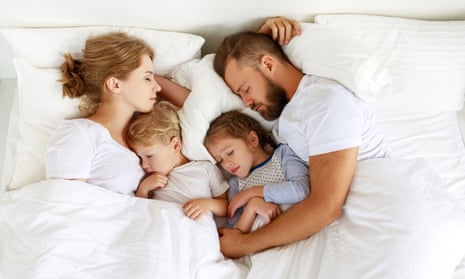A question to keep parents up at night: whether to allow their children into their bed

Christina Ricci’s comment that she frequently shares a bed with her eight-year-old son has led to a debate about co-sleeping: should kids be kept firmly in their own rooms, and can you stop them climbing under your duvet even if you don’t want them to?
A passing comment by the Hollywood actor Christina Ricci that she shares a bed with her eight-year-old son became an international news story last month. Whereas she has her bed invaded by her older child, her youngest sleeps soundly solo. “The fact that I can put her down in her crib and she just goes to sleep when my eight-year-old still sleeps with me is amazing,” she told People magazine.
Few things in the parenting world attract more opinions than sharing a bed with your baby or child. And understandably so: according to The Lullaby Trust, around 133 babies die each year in the UK in co-sleeping situations. The death of a baby is a tragedy beyond comprehension and I was so frightened of the possibility that I spent the first two years of my son’s life stumbling around in the dark and trying miserably to settle him in a cot, hallucinating with tiredness and vibrating with adrenaline. Until he became big enough and mobile enough, after transitioning to his first bed, that to keep him from invading ours felt like trying to keep the Atlantic Ocean off a beach.
But things get less clear as children get older. The five, seven, or even 10-year-olds who creep under the duvets of their parents’ or carers’ beds like a tarantula while they are barely conscious. Are you making a rod for your own back by letting them sleep with you? Are you simply responding to the needs of your individual child? Is this gentle parenting gone mad?
This is, of course, an extremely western debate. In large parts of the world, co-sleeping (which tends to mean sharing a room but can also mean sharing a sofa) and bed-sharing (more self-explanatory) are ubiquitous to the point of being unremarkable. Janhavi Jain, who is 23 and grew up in India, describes the practice of sleeping alongside your parents as “very common” well into late childhood. “I grew up in a family that was very close knit. We slept with our parents until the age of five or six,” she tells me over the phone from Delhi.
Talk to parents for any length of time about sleep and one resounding truth will emerge; that we all feel judged about it. Those, like me, who put their children in separate rooms, did sleep training and shut their bedroom doors. Those who have children in their bed. Those who sleep on mattresses on their children’s floors.
READ RELATED: Practical hacks for our slippery specs | Letters
“It is interesting and increasingly frustrating to me how much space is taken up with people being convinced that there is one way that is better than another way,” says Dr Jen Wills Lamacq, a psychologist specialising in the early years. “Without getting on my soapbox, that distracts people from what they need to be getting on with. What I say to parents, when they’re making any caring decision that they think will have a long-term consequence, is that you’re making that caring decision to meet the needs of your child. And meeting a child’s needs – physical or emotional – sets a good foundation for adulthood.” Bearing in mind the specific caveats about safe sleeping for infants – that may mean sharing a bed, it may mean putting them in their own bed – you know your child and you know your own family.
Sarah Ockwell-Smith, author of The Gentle Sleep Book says: “I’ve got four kids, I’ve been a working mum for ever; I get that it’s exhausting and our society is crap for parents. I just think there must be a middle ground. It’s really, really hard being a parent and we need more sleep. So if bed-sharing means you get more sleep, then go for it.”
It should be said that co-sleeping is not always a choice. Many parents do not have the financial means to put their child in a separate bedroom. Some parents, due to experiences in their own lives, including disability or work patterns, will neither want nor be able to co-sleep. Some, like me, will start off on one tack and evolve to another. Furthermore, the picture will look very different for single-parent families, large families, foster and adoptive families and families of different cultural backgrounds.
Perhaps the greater question, then, is what long-term effect bedsharing or co-sleeping has on a child’s development? Again, the answer is not simple. “Later co-sleeping [in the United States and UK] is something we don’t have much data on,” says Emily Oster, an economics professor at Brown University who has written bestselling evidence-based pregnancy and parenting books. Even if you were to compare a child who co-slept until they were seven with a child who didn’t, says Oster, there are still going to be so many differences in their experiences of childhood that to pull out the single thread of co-sleeping is almost impossible. “So it’s not just that we don’t have a lot of data about that but that it would be difficult to learn very much from it.”
What we do know is that bedsharing with a grown child is comparatively very safe. Once a toddler can rotate across your mattress like a fleshy catherine wheel, many of the risks associated with bedsharing have diminished. Also, as with all areas of parenting, well-laid plans are only ever that; you can never fully predict what you’ll do or if they will stay in their own bed for ever. “I’m not sure if Christina Ricci would have expected to be doing this when she first became a mother,” says Oster, “but it’s one of those things that works for your family and there’s no particular reason not to.”
If we educate parents – allow them to make an informed decision about the risks and benefits – they would probably feel less guilty, anxious and stressed about what they’re doing. They may even, who knows, raise more contented children. Or be a little less sleep deprived. In the meantime, if anyone knows how to get toast crumbs, urine and an array of stuffed whales out of their bedding, I’m all ears.
Source: Health & wellbeing | The Guardian





